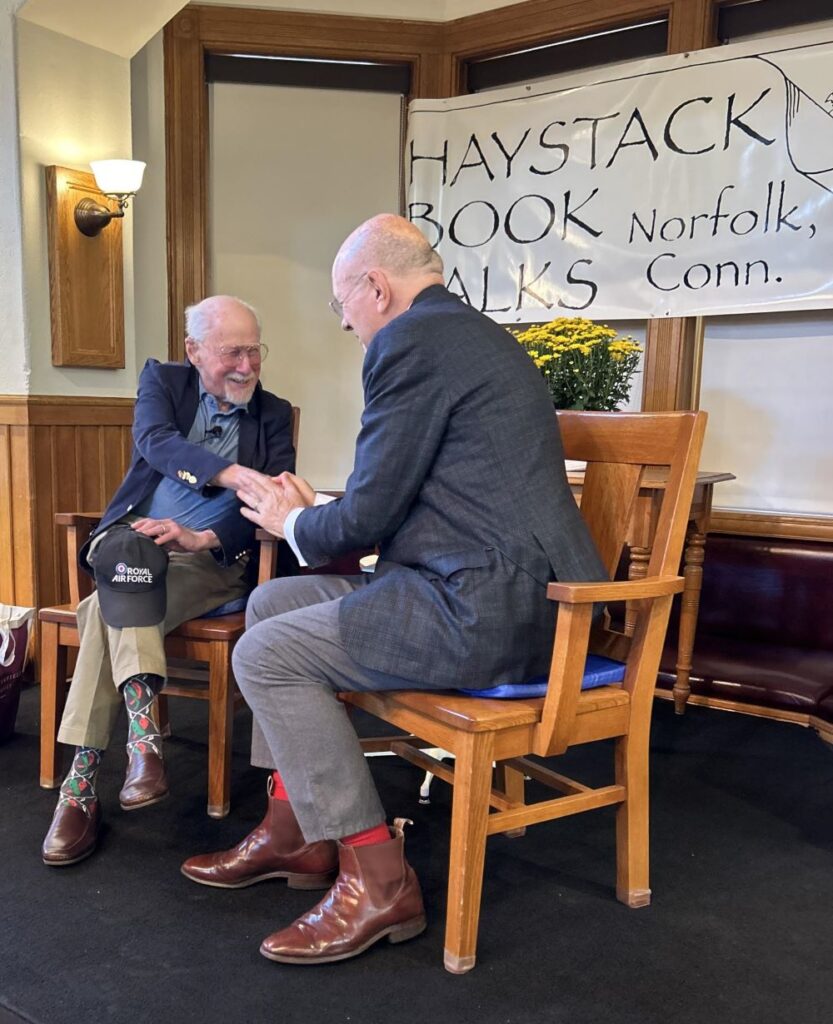The haystack book festival at six: intimate and quirky
By Joe Kelly
While Norfolk has long been a well-known destination for art and music, in recent years it’s also become a place to celebrate writing and literature—with much credit for that going to the annual Haystack Book Festival, which celebrated its sixth year this October.

Michael Korda (left) and Simon Winchester at the Haystack Festival.
For the festival weekend, Haystack pairs writers with other writers for lively discussions—this year the topics ranged from dance and poetry to quantum theory and the natural world.
The only exception to the writer/writer format is the annual Brendan Gill Lecture, given each year in memory of the legendary New Yorker writer and critic who was also a long-time resident of Norfolk. This year’s honoree was his granddaughter, Gillian Linden, who read from her novel “Negative Space.” Set during Covid, it’s a story, nimbly told, of the repercussions that befall a part-time English teacher at a New York City private school who witnesses what she believes may have been an inappropriate interaction between a teacher and student.
“Believes” and “may” are the operative words here. Linden’s debut novel is about the world you inhabit when you aren’t sure of what you’ve seen—and yet you could be under a professional obligation to report it. It’s a serious topic, but in Linden’s hands it’s also an opportunity to explore other negative spaces: marital life squeezed between Zoom calls, dinners prepared for thankless children, the bland double-talk of school administrators. The result is a 160-page dark comedy with an ending that’s all too punishingly real.
Like Brendan Gill, Michael Korda is another legend of the book world. After some 40 years as an editor at Simon & Schuster (much of it as editor-in-chief), Korda “retired” to write a series of highly successful works of nonfiction, biography and memoir. Paired at Haystack with the accomplished author and journalist Simon Winchester, they chatted about Hungary (where Korda’s family is from), London (where both were born), the movie business (Korda’s father and uncles were major figures through the 1950’s) and, ultimately, Korda’s latest book “Muse of Fire: World War I as Seen Through the Eyes of the Soldier Poets.”
Korda was compelled to write the book, he said, after learning the story of Wilfred Owen, whose wartime poems helped open the door to Modernism, but who was killed in action at age 25, a week before the war’s end. His mother learned of her son’s death via the telegram that she tore open on Armistice Day as church bells rang in celebration of the peace.
Just nine years after the war-to-end-all-wars, Charles Lindbergh flew nonstop and solo from New York to Paris—a triumph of modern technology. As Lindbergh was aloft, the German physicist Werner Heisenberg was in Copenhagen studying the movement of sub-atomic particles and realizing that matter at this fundamental level doesn’t travel through time and space like a plane. While one could calculate Lindbergh’s exact position and momentum at any given moment, this can’t be done for an electron. This is the famed Heisenberg uncertainty principle that launched the era of modern quantum mechanics.
William Egginton uses this Lindbergh/Heisenberg set piece to open “The Rigor of Angels: Borges, Heisenberg, Kant and the Nature of Reality”—an intimidating title that belies a deeply thought out, accessible book. A professor of Humanities at Johns Hopkins (paired in Norfolk with the intellectual historian Sam Moyn of Yale), Egginton teases out the implications of the uncertainty principle through its echoes in the fiction of Jorge Luis Borges and its foreshadowing in the philosophy of Immanuel Kant, while also touching on Augustine, Dante, Einstein, medieval astronomers and the Greek philosopher Zeno. This is a full humanities course of a book that leaves you in awe of the rigor that enabled Heisenberg, Borges and Kant to probe the nature of reality so deeply, but also somehow numbed them to political realities: Nazis (Heisenberg), the Argentine Junta (Borges) and the German monarchy (Kant).
A running theme of Haystack festivals is the human connection with the natural world, represented this year by “These Trees Tell a Story: The Art of Reading Landscapes” by biologist Noah Charney and discussed with Mike Zarfos, executive director of Great Mountain Forest. When queried on climate change and habitat loss, Charney’s responses leaned toward polite indifference. As the title of his book suggests, he’s interested in reading landscapes, not necessarily changing them. His message was one of acceptance: the landscape that’s before you right now, however deteriorated, will be there a long time.
Best get to know it.
A perhaps more appealing investigation of the complicated human/nature relationship took place at the last major panel, featuring the New York Times reporter Sarah Maslin Nir and David Chaffetz discussing his book “Raiders, Rulers and Traders: The Horse and the Rise of Empires.” It details how over several thousand years horses were transformed from a source of meat and milk into a strategic asset for waging war and building empires.
Much of the action in this original and deeply researched book takes place on the vast Central Asian steppe where mineral-rich grasslands proved ideal for breeding horses and fueled the rise of such legendary conquerors as Genghis Kahn. By controlling the supply of horses, the steppe horsemen—as traders, raiders and rulers—controlled the destiny of empires, a lesson that the Tang in China, the Mughals of India, the tsars of Russia and many others ignored at their peril. Chaffetz recounts this epic, sprawling story in incredible detail, yet never loses hold of the reins.
Book festivals tend to be found near big cities or major academic centers. Norfolk has neither, which makes the successful orchestration of Haystack all the more remarkable. Over its six years, Haystack has grown to be a festival unlike any other—small, quirky, intimate—like Norfolk itself.
